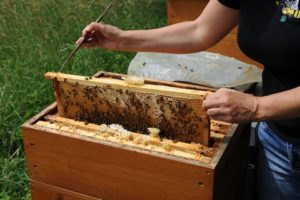Our idea of sustainability refers to the fact that we are all part of a large cycle. The living beings in this cycle are interdependent. This means that everyone has their role and is important for the continuity of the system. So we have to admit that even the smallest, most annoying mosquito is somehow useful and every spider has its right to exist.
What we (and many others) have noticed this summer is that the number of bees and other pollinating insects seems to have decreased. Whereas according to a "large inquiry" of the Green Party to the federal state parliament in Baden Württemberg (Germany), the number of the bee colonies is stable or even increases. Thanks to active beekeepers, whose number slowly increases with the awareness of the problems of bees.

Why are bees so important to us in general? After all, it is easy to do without honey alone. According to the "Landesanstalt für Bienenkunde (LAB)", an institute at the University of Hohenheim in the south of Germany, the pollination of cultivated plants in Europe by bee colonies is worth approximately 65 billion euros. This means that the actual value of bees' work for all plants is unimaginably high and cannot be quantified scientifically.
Bee-Sponsorship
After a discussion over coffee about ecosystems in general and bees in particular, the idea to support the care of local bees arose in the office. So in spring, we contacted a beekeeper from nearby our headquarter for a bee sponsorship. The "sponsor" pays a more or less small amount and thus finances part of the work for a beehive. The aim is to publicize the needs of bees and to promote biodiversity in other ways. For example, by planting different meadow flowers in cities (so-called "sealed areas").

So if you feel like getting involved, just buy a small bag of meadow flower seeds and plant them in your front garden or on the balcony. There are also bee sponsorships everywhere in Germany to make a financial contribution.
The sponsorship has brought us new insights, excellent honey and lots of fun.
